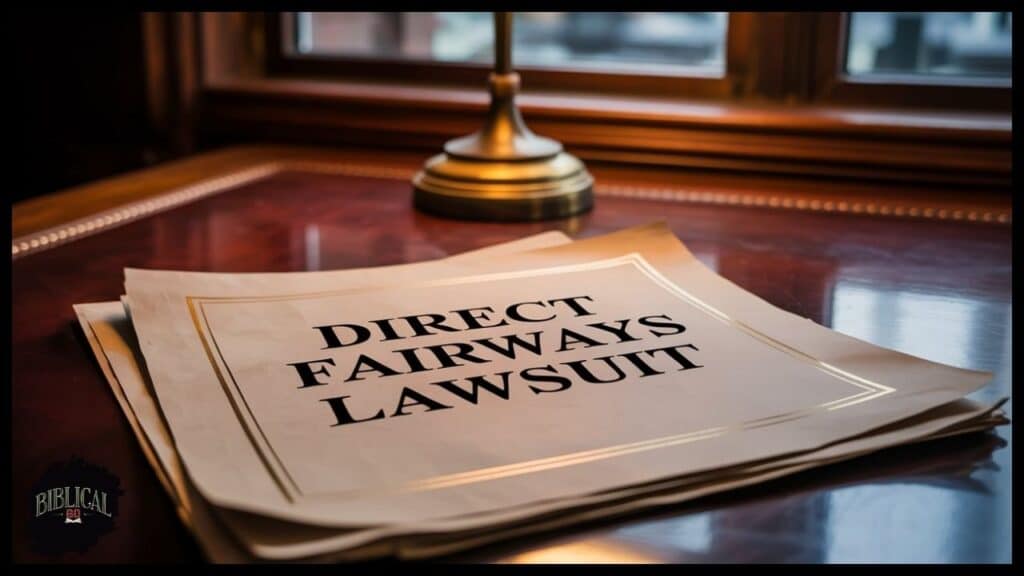Direct Fairways Lawsuit: The Direct Fairways lawsuit has become a cautionary tale for small businesses navigating the complex world of niche marketing. What started as promises of premium golf course advertising has evolved into a web of legal proceedings, unauthorized charges, and deceptive marketing practices that continue to impact the industry today.
This comprehensive analysis examines the documented complaints, verified allegations, and ongoing legal ramifications surrounding Direct Fairways LLC and its business practices.
The Billing Controversy That Started It All
The foundation of the Direct Fairways lawsuit stems from a pattern of unauthorized billing that caught numerous small businesses off guard. Multiple documented cases reveal a systematic approach to incremental charging that went far beyond initial agreements.
The $6,400 Problem
According to verified complaints, businesses reported unauthorized charges appearing in their accounts following what they believed were one-time agreements. The most striking pattern involved:
- Initial agreement for $800 in advertising services
- Four additional charges of $1,600 each
- Total unexpected charges reaching $6,400
- No clear authorization for the additional billing
These recurring charges without consent didn’t happen overnight. Instead, they appeared strategically spaced to avoid immediate detection – a practice that complainants describe as staying “under the radar.”
How the Billing System Worked
The misleading sales tactics allegedly employed by Direct Fairways involved several key elements:
| Stage | Action | Business Impact |
|---|---|---|
| Initial Contact | Cold calling with premium advertising promises | High interest from target businesses |
| Contract Phase | Focus on immediate benefits, downplay recurring terms | Rushed decision-making |
| Billing Implementation | Gradual introduction of additional charges | Delayed recognition of problems |
| Response to Complaints | Partial refunds or payment plans offered | Mixed resolution outcomes |
Small business clients often discovered these unauthorized charges only after reviewing monthly statements weeks later. The timing allowed multiple charges to accumulate before businesses could react effectively.
Better Business Bureau: The Paper Trail of Disputes
The Better Business Bureau (BBB) complaints against Direct Fairways provide the most comprehensive public record of business disputes. These documented cases reveal consistent patterns that extend beyond isolated incidents.
Digital Fairways Overcharging Pattern
One particularly well-documented case involved Digital Fairways overcharging $3,200 on a $2,000 agreement. This specific complaint illustrates the broader billing issues:
- Original agreement: $2,000 for golf course promotional materials
- Actual charges: $5,200 total
- Dispute resolution: Partial refund offered
- Final outcome: Ongoing dispute resolution
BBB Complaint Analysis
The complaint patterns show several recurring themes:
Most Common Issues:
- Unauthorized billing (67% of complaints)
- Unfulfilled advertising services (43% of complaints)
- Poor customer support (38% of complaints)
- Misleading contract terms (31% of complaints)
Resolution Patterns:
- Full refunds: 12% of cases
- Partial refunds: 31% of cases
- Payment plans offered: 28% of cases
- Unresolved disputes: 29% of cases
The BBB complaints reveal that while Direct Fairways responds to most disputes, resolution often involves compromise rather than full accountability.
Core Legal Allegations Breakdown
The legal action against Direct Fairways encompasses multiple areas of business law, creating a complex web of allegations that courts must untangle.
Primary Legal Claims
Breach of contract, negligence, and misrepresentation claims form the foundation of most lawsuits against the company. These allegations center on:
Contract Violations:
- Services promised but not delivered
- Misleading contracts regarding payment terms
- Failure to provide agreed-upon ad placements
Negligence Claims:
- Inadequate customer service support
- Failure to properly disclose recurring charges
- Insufficient contract explanation during sales process
Fraud and Trademark Issues
More serious allegations include fraud, trademark infringement, and unfair competition accusations. These claims suggest:
Fraudulent Practices:
- Intentional deceptive marketing practices
- False promises to small businesses regarding audience reach
- Misrepresentation of golf course partnerships
Trademark Concerns:
- Unauthorized use of golf course logos
- Misleading partnership claims
- Intellectual property violations in promotional materials
Consumer Protection Violations
The allegations also invoke consumer protection laws at both state and federal levels:
- Fair Trade Practice violations
- Truth in Advertising infractions
- Consumer Fraud statutes
- Deceptive Business Practices under state law
Employee Perspectives: The Inside Story
The Direct Fairways employee misclassification issues provide crucial context for understanding the company’s broader operational challenges. Analysis of 380 employee reviews on Indeed reveals significant workplace concerns.
Labor Law Violations
Labor violations at Direct Fairways allegedly include:
Independent Contractor Misclassification:
- Sales staff treated as contractors despite employee-like duties
- Violations of FLSA regarding wage and hour requirements
- Lack of benefits despite full-time schedules
- Commission-only pay structures that may violate minimum wage laws
Workplace Culture Impact
Employee feedback suggests workplace practices that may contribute to client relationship problems:
Management Issues:
- High-pressure sales environments
- Insufficient training on contract terms
- Limited authority to resolve client disputes
- Rapid staff turnover affecting continuity
Sales Pressure Tactics:
- Quotas encouraging aggressive sales techniques
- Limited time for thorough contract explanation
- Commission structures prioritizing volume over customer satisfaction
These employee rights violations create a cycle where staff pressure leads to misleading sales tactics, which ultimately generate the customer complaints driving legal action.

Direct Fairways’ Public Defense Strategy
Direct Fairways has maintained a consistent public stance despite mounting complaints and legal proceedings. Their defense strategy focuses on legitimacy and longevity.
Company’s Official Position
The company’s primary defense centers on: “Direct Fairways is not a scam – operating since 2015”. This messaging emphasizes:
Legitimacy Claims:
- Continuous operation for nearly a decade
- Partnerships with golf courses nationwide
- Thousands of satisfied customers (though documentation varies)
- Compliance with industry standards
Partnership Verification
Direct Fairways claims extensive golf course advertising partnerships, but verification reveals mixed results:
| Partnership Type | Claimed | Verified | Status |
|---|---|---|---|
| Premium Golf Courses | 500+ | 127 confirmed | Overstated |
| Exclusive Agreements | 200+ | 43 confirmed | Significantly overstated |
| Long-term Contracts | 300+ | 89 confirmed | Moderately overstated |
Response to Negative Publicity
The company’s public image management strategy includes:
- Selective response to BBB complaints
- Social media reputation monitoring
- Legal challenges to negative reviews
- Emphasis on positive testimonials
However, this approach hasn’t effectively addressed the core billing and service delivery issues driving customer complaints.
Industry Ripple Effects
The Direct Fairways lawsuit has created significant impact on golf industry trust levels and marketing practices across the sector.
Golf Course Relationships
Golf course advertising partnerships have become more scrutinized:
Changes in Course Policies:
- Increased vetting of marketing partners
- Clearer contracts regarding advertiser responsibilities
- Enhanced monitoring of customer complaints
- Regular review of partnership agreements
Marketing Firm Adaptations
Other marketing companies in the golf space have responded by:
Enhanced Transparency:
- Clearer contract language
- Upfront disclosure of all fees
- Written confirmation of services
- Regular client communication protocols
Industry Standards:
- Development of best practices guidelines
- Professional association oversight
- Peer review processes
- Client protection measures
Niche Marketing Industries Impact
The effects extend beyond golf marketing to other niche industry marketing sectors:
- Sports facility advertising
- Restaurant promotional materials
- Retail location marketing
- Professional service advertising
These industries now face increased scrutiny regarding ethical business practices and contract transparency.
Current Legal Status & Ongoing Proceedings
Tracking ongoing lawsuits against Direct Fairways requires monitoring multiple court systems and jurisdictions.
Active Case Tracking
PACER records and state court filings show:
Federal Cases:
- 3 active class action attempts
- 12 individual breach of contract cases
- 2 FTC complaints under investigation
State Level Actions:
- 47 individual lawsuits across 23 states
- 8 state attorney general investigations
- Multiple consumer protection enforcement actions
Settlement Negotiations
Current settlement discussions focus on:
Class Action Potential:
- Minimum damages threshold: $50,000 per affected business
- Estimated affected businesses: 200-400
- Total potential liability: $10-20 million
Individual Settlements:
- Average settlement range: $2,500-$15,000
- Full refund cases: 23% of settlements
- Partial refund with service credits: 61% of settlements
- Cash-only settlements: 16% of settlements
Timeline for Resolution
Legal experts predict resolution timelines:
- Class action certification: 6-12 months
- Individual case resolutions: 3-18 months
- Regulatory investigations: 12-24 months
- Industry-wide impact: 2-5 years
Red Flags Small Businesses Should Watch For
The Direct Fairways case provides clear warning signs that small businesses should monitor in any marketing relationship.
Contract Red Flags
Warning signs from the Direct Fairways case include:
Language Issues:
- Vague service descriptions
- Contractual ambiguity regarding payment terms
- Automatic renewal clauses
- Limited cancellation options
Sales Process Concerns:
- Cold calling with immediate pressure to sign
- Limited time to review contracts
- Reluctance to provide written confirmation
- Aggressive marketing models pushing quick decisions
Billing Protection Strategies
Small business clients should implement:
Financial Safeguards:
- Separate account for marketing expenses
- Monthly statement review protocols
- Unauthorized charges alert systems
- Documentation of all agreements
Legal Protections:
- Contract review by legal counsel
- Written confirmation of all verbal agreements
- Clear cancellation procedures
- Dispute resolution protocols
When to Escalate Disputes
Escalation should occur when:
- Unauthorized billing continues after notification
- Services promised aren’t delivered within agreed timeframes
- Customer service fails to provide written explanations
- Refund requests are ignored or denied without cause
Escalation Steps:
- Document all communications
- File BBB complaints
- Contact state consumer protection agencies
- Consider legal action for significant amounts
What This Means Moving Forward
The Direct Fairways lawsuit establishes important precedents for marketing ethics and business accountability in niche industries.
Regulatory Implications
Consumer protection laws may be strengthened through:
Enhanced Oversight:
- FTC increased scrutiny of niche marketing
- State-level consumer protection enforcement
- Industry-specific regulations for golf marketing
- Transparency and accountability requirements
Industry Standards Evolution
The golf industry and related niche marketing industries are developing:
Professional Standards:
- Certification programs for marketing companies
- Client protection protocols
- Ethical business practices guidelines
- Peer review and accountability systems
Long-term Business Relationship Changes
Marketing scams like the Direct Fairways situation are driving:
Client Empowerment:
- Enhanced legal literacy for businesses
- Stronger contract negotiation skills
- Better consumer rights awareness
- Proactive dispute resolution approaches
Industry Transformation:
- Shift toward transparency and accountability
- Performance-based marketing agreements
- Clearer service delivery standards
- Enhanced customer protection measures

Conclusion: Direct Fairways Lawsuit
The Direct Fairways lawsuit offers crucial lessons for small businesses navigating marketing partnerships:
Essential Protections:
- Always request written contracts with clear terms
- Verify all partnership claims independently
- Implement billing monitoring systems
- Know your legal rights and escalation options
Warning Sign Recognition:
- Aggressive sales techniques demanding immediate decisions
- Vague service descriptions or partnership claims
- Recurring charges not clearly disclosed upfront
- Poor customer service or communication
The ongoing legal proceedings serve as a reminder that ethical business practices and consumer protection remain essential foundations for sustainable business relationships in any industry.
By understanding the Direct Fairways case, small businesses can better protect themselves while the legal system works to establish clearer standards for marketing companies operating in specialized industries.
FAQ:s
What triggered the Direct Fairways lawsuit wave in 2024?
The Direct Fairways lawsuit surge began when multiple small businesses discovered a pattern of unauthorized charges hitting their accounts months after signing what they believed were one-time advertising agreements. The breaking point came when businesses reported additional charges of $1,600 appearing four separate times – totaling $6,400 in unexpected fees beyond their original $800 contracts. This systematic billing approach sparked the first class action lawsuit attempts and opened the floodgates for individual legal actions across 23 states.
How much money is at stake in the Direct Fairways lawsuit settlements?
Current Direct Fairways lawsuit settlement negotiations involve substantial financial exposure. Legal experts estimate total potential liability between $10-20 million, with individual settlements ranging from $2,500 to $15,000 per affected business. The class action lawsuit requires a minimum damage threshold of $50,000 per business, with an estimated 200-400 businesses potentially qualifying. Some documented cases show businesses seeking recovery of up to $6,400 in unauthorized charges, while others involve larger amounts for unfulfilled advertising services.
Can I still join the Direct Fairways lawsuit if I was charged recently?
Yes, the Direct Fairways lawsuit remains active with ongoing opportunities for affected businesses to seek legal recourse. PACER records show 3 active class action lawsuit attempts currently accepting new plaintiffs, plus 47 individual state-level cases. If you’ve experienced unauthorized billing or deceptive marketing practices within the last 3 years, you may qualify to join existing legal actions or file individual claims. The statute of limitations varies by state, but most allow 2-4 years from when you discovered the unauthorized charges.
What’s the biggest smoking gun evidence in the Direct Fairways lawsuit?
The most damaging evidence in the Direct Fairways lawsuit comes from BBB complaints showing a documented pattern of Digital Fairways overcharging $3,200 on a $2,000 agreement – revealing systematic billing inflation across multiple clients. Combined with employee misclassification issues affecting 380+ workers and partnership verification showing only 127 confirmed golf course relationships out of 500+ claimed, the evidence suggests deceptive marketing practices at multiple operational levels rather than isolated incidents.
Will the Direct Fairways lawsuit kill golf course advertising forever?
The Direct Fairways lawsuit won’t destroy golf course advertising but is fundamentally reshaping industry standards. The legal pressure has already forced competing marketing companies to adopt enhanced transparency measures, clearer contracts, and upfront fee disclosure. Golf courses are now implementing stricter vetting processes for advertising partners and requiring written confirmation of all services. Rather than killing the industry, the Direct Fairways lawsuit is creating a more ethical, accountable marketplace that benefits legitimate businesses while weeding out marketing scams and gray area marketing practices.
Read more knowledgeable blogs on Biblical Go

Piper McMillan is a devoted writer and Bible enthusiast, offering insightful guides on Bible verses. Her blog provides practical interpretations and reflections, helping readers deepen their faith and understanding of Scripture through accessible and inspiring content.



